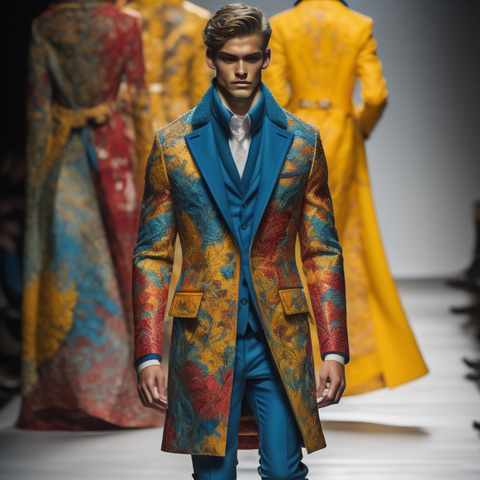what is fashion?
What is fashion?
Fashion plays a important role in shaping how individuals perceive themselves and interact within society, intricately linked to the human appearance. It encompasses a wide spectrum of styles, trends, and aesthetics that vary based on the cultural, social, and economic contexts of a particular time and place. Fashion encompasses not only clothing but also accessories, hairstyles, makeup, footwear, and lifestyle choices, all of which contribute to expressing a person's individuality and reflecting their cultural influences. Shop mens fashion clothing Here

A man in a fashion long coat on the runway fashion show
The relationship between fashion and human identity is profound, as what people choose to wear and how they style themselves can convey messages about their personality, values, and aspirations. Through fashion, individuals can establish their unique identity, express their creativity, and communicate their belonging to specific social groups or communities. Fashion is a form of self-expression that allows people to showcase their tastes, preferences, and sense of aesthetics, contributing to a sense of belonging and connection within society.
Fashion at its' essence is about self-awareness, self-autonomy, and self-expression. Innovation, creativity, and problem solving are just a few qualities that fashion brings to the society. Furthermore fashion allows individuals to communicate their personality, values, and aspirations through the way they dress and style themselves. Fashion is also a form of artistic expression, with designers and artists creating innovative and captivating designs that inspire and influence trends.
Fashion plays a significant role in society by reflecting and shaping cultural norms, beliefs, and values. Historical events, pop culture, subcultures, and global movements can influence fashion, resulting in diverse and eclectic fashion trends. Additionally, industries such as textile, retail, media, advertising, and entertainment closely tie with fashion, contributes to economic growth and employment opportunities.
fashion at its' core is formed with sculpture and drawing, and we build the human civilization with these two art. throughout human history is evident that rise and fall of civilizations are directly connected to the growth of these two are in the society. Ancient civilization like egypt persian, greeks and romans were conquered by the one who was better than others in these two art. This is evident theough remaining artifacts, sculptures and coins.
it looks that the nations that did not developed in these two art not only are less developed but also less realistic and they hang on mythical story and develop less of critical mind. That why in 2014 a new field of the psychology of fashion was developed.
Moreover, fashion is a dynamic and ever-evolving concept that responds to various influences, including social, cultural, economic, and technological changes. Trends in fashion often emerge in response to shifts in societal norms, advancements in technology, or cultural movements. For example, the rise of sustainable fashion reflects a growing awareness of environmental issues and a desire for more ethical and eco-friendly clothing options. Technological advancements have led to innovations in fabrics, manufacturing processes, and digital fashion experiences, thereby shaping the creation, consumption, and perception of fashion.
The study of clothing, style, appearance, and the psychological effects of fashion on behavior, emotions, and thought processes is known as fashion psychology. Fashion psychology delves into how an individual's wardrobe choices, fashion sense, and personal style impact their self-perception, self-expression, identity formation, and interpersonal relationships. Fashion choices can define a person's own identity and communicate their connection to particular social groups or communities. They can also communicate messages about a person's personality, values, and goals.
Because it both reflects and shapes cultural norms, ideas, and values, fashion has a big impact on society. Diverse and varied fashion trends can be the outcome of historical events, pop culture, subcultures, and international movements influencing fashion. A number of industries, including textiles, retail, media, advertising, and entertainment, strongly relate to fashion, supporting job creation and economic expansion.
The field of psychology of fashion encompasses the subfields of identity and self-expression, body image and self-esteem, consumer behavior, social psychology of fashion, cognitive psychology of fashion, and fashion and mental health. Fashion psychology frequently investigates how people's impressions of their bodies and their looks affect their self-esteem and body image, which in turn can affect behaviors linked to exercise, dieting, and general health.
Since clothes can affect people's motivation and mindset toward diets and exercise, clothing and motivation are also significant components of fashion psychology. Health-related themes and fashion trends can coexist, promoting body positivity, healthy living, and self-care. There is also an exploration of the psychological effects of look and weight, emphasizing the intricate relationship between psychological health, body image, and fashion.
More sources on Fashion:
https://en.wikipedia.org/wiki/Fashion
https://fashiontextilemuseum.org/
https://www.pbs.org/newshour/classroom/posts/1999/10/what-is-fashion
Leave a comment